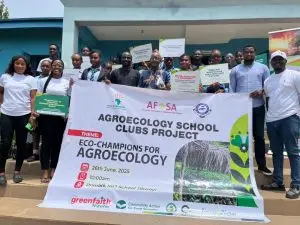In a bold move to address the growing environmental and food system challenges in Nigeria, EcoSteward and Humanitarian Foundation under the auspice of Alliance for food sovereignty in Africa (AFSA), in collaboration with local civil society partners, have launched an innovative school-based program titled “Agroecology in Action: Growing Young Eco-Champions.” The initiative is already gaining ground with its pilot launch at Primark International School, Jikwoyi, Abuja.
Nigeria’s agricultural landscape is under increasing pressure from land degradation, biodiversity loss, climate change, and food insecurity. Yet, in the face of these challenges, one crucial group has often been overlooked—young people. The Agroecology Club project seeks to change that by empowering students at the secondary school level with the knowledge, skills, and values to become environmental stewards and food system changemakers.
Mr Nweze Emmanuel Obinna, The Program Director Ecosteward and Humanitarian Foundation stated that the project introduces Agroecology and Food System Clubs in secondary schools, transforming them into vibrant learning hubs where students explore sustainable farming, climate action, and food justice through hands-on activities and peer-led projects. The clubs are not just about theory they come to life with demonstration gardens, eco-literacy training, and student-led campaigns, linking classroom education with real-world solutions.
Under the theme “Eco-Champions for Agroecology,” the program aims to foster environmental leadership and inspire youth-driven innovation. It promotes a practical understanding of how agroecological practices—such as composting, crop rotation, organic pest control, and rainwater harvesting—can improve food security and restore ecosystems.
Speaking at the launch event, project leads emphasized the urgent need to reconnect young people with the land and equip them for the green careers of the future. “We believe schools are the seedbeds of transformation,” said one facilitator. “By investing in students today, we are growing tomorrow’s climate leaders.”
Beyond awareness, the project’s vision is firmly rooted in sustainability. Each club is integrated into the school’s extracurricular structure, supported by trained teachers and local partners, ensuring it remains active and relevant long after the pilot phase.
As the project moves forward, the next steps include expanding to more schools, strengthening partnerships, and documenting impact stories to inspire wider policy integration of agroecology into Nigeria’s education and agricultural development strategies.
In a time when climate action can feel overwhelming, this project offers a refreshing model of hope—one where young people are not just part of the future but are actively building it.

